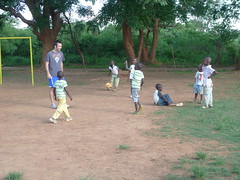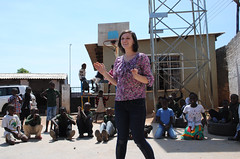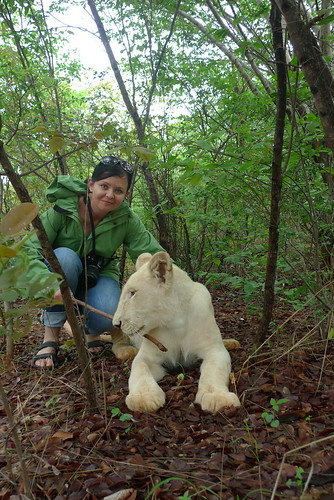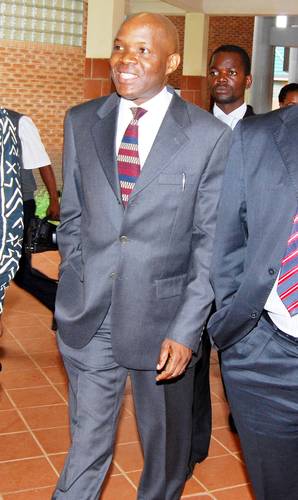By Lindsay Boyle
Eighteen Ohio University students embarked on a journey on Nov. 25, 2011 that turned out to be even more life changing than they had anticipated. The students—from various media and communications-related majors—arrived in Zambia, Africa after more than 20 hours of flight, where they began a jam-packed three-week study abroad program.
Their first experience in Africa was transiting through the modernized O.R. Tambo International Airport in Johannesburg, South Africa, which quickly dispelled any misconceptions they may have had about African development as a whole.
Their arrival to the four-star Cresta Golfview Hotel in the considerably Westernized Zambian capital city of Lusaka only furthered that reality. Traffic on the road was constant and intense. Tall buildings equipped with electricity and Internet access lined the city streets. On the surface, Lusaka looked like it could be a city in the U.S.
However, that is not to say it actually is like a city in the U.S. By U.S. standards, food service was incredibly slow and often, menu items were not available at all. Internet access—whenever it worked—was also sluggish. Rolling electricity blackouts were common. Toilet paper was a luxury.
And that is the capital city.
Just outside Lusaka, in some cases less than ten minutes away, the scenery was quite different. During their three weeks in Zambia, students had many opportunities to experience such scenery—what some Zambians call “the real Zambia.”
Huts made with combinations of straw, wood, mud, bricks and other natural materials were scattered in the slums of the countryside, sometimes connected by dirt roads and, in other instances, not connected at all. Such villages had little or no access to electricity. Villagers sometimes had to walk miles to gather safe drinking water. “Toilets” were literally holes in the ground called pit latrines. Preventable disease and other health-related hazards were quite rampant.
Hundreds of Zambians sprawled their goods out at congested marketplaces, crammed in muddy, low-lying areas lined with trash and infested with flies. They did this every day; their only source of income came from the products they sold.
“My biggest culture shock in Zambia was when we went to the Soweto Market. There were a lot of babies walking barefoot with distended bellies and women crouching in the mud selling whatever goods they had,” senior Amber Skorpenske said. “Then it really hit me that I was actually in Africa.”
Children who, in most cases, had lost their parents to HIV and AIDS resided at places such as Kasisi Children's Home. When students visited Kasisi, they realized that the children there, who had often been through more in ten years than many people experience in a lifetime, were still grateful and full of excitement for life.
In fact, many of the Zambians were grateful and quite content with the little they had, regardless of their socioeconomic statuses or life situations.
Students experienced that excitement not only in the people they met, but also when they were learning an upbeat traditional Zambian dance and while playing football (soccer) with University of Zambia students.
In addition to local cultural encounters, students also traveled across the country, both to the Copperbelt Province and Livingstone.
In the Copperbelt region, students toured copper mines and plants, learning first hand about the industry that Zambia’s economy is heavily reliant upon.
The weekend spent in Livingstone is one many students said was the best weekend of their entire lives. From seeing Victoria Falls—widely considered one of the seven Natural Wonders of the World—to riding elephants, playing with lions and cheetahs, bungee jumping and more, the students embraced adventure, doing things they never thought they would.
The students also surprised themselves in other ways, taking Zambia by storm via their internships. Students with media internships traveled around Lusaka, meeting important officials and seeing first hand how stories come together in Zambia. Others volunteered at nonprofit organizations, developing programs for and working with orphans and widows. One of the students interned at the University Teaching Hospital.
Two students published three articles in two different national newspapers—the Times of Zambia and the Daily Mail. One student appeared on ZNBC national television for a nightly news segment. Other students designed entire ad campaigns and public relations plans for agencies such as Young and Rubicam as well as Goman Advertising Limited.
Some students who interned at S.O.S Children’s Village subsequently sponsored some of the children, a humanitarian responsibility that entails contributing money on a monthly basis in order to help pay for necessities like food and clothing.
“My internship opened my eyes to the struggles in the world that are beyond our knowledge and sometimes our comprehension,” said sophomore Brooke Bunce, who interned with the Chikumbuso Women and Orphans Project. “It helped me to realize that even the simple things can help someone else in need.”
Through their internships, students observed places in Zambia they would not have otherwise seen and received cultural advice they would not have otherwise learned. The internships proved to be an imperative component of the study abroad program.
A final component of the study abroad program, as expected, was the classes. Students commuted to the nearby University of Zambia twice a week to take two journalism courses, learning about different aspects of Zambian media and culture from UNZA communications lecturer Kenny Makungu as well as multiple guest speakers.
While spending time on the UNZA campus, OU students were able to meet and become close with several UNZA students. The two groups of students participated in many events together and regularly engaged in conversations about cultural differences—everything from politics to food to popular music.
The importance and impact of the friendships between OU and UNZA students—many of which are still in contact—is immeasurable.
OU students went abroad to Zambia fully expecting to learn from their courses. When they returned, however, they realized they had learned from every single moment they spent in Zambia.
Tuesday, January 24, 2012
Zambia: Learning every step of the way
Topics: Zambia study abroad
Friday, January 20, 2012
Spend Summer Covering 2012 Olympics
By: Morgan Sigrist
IIJ Ambassador  The Office of Education Abroad and the Institute for International Journalism (IIJ) are accepting applications for a summer study abroad program to London, England, July 23 through August 13, 2012. The program is yet another global initiative of the E.W. Scripps School of Journalism. Professor Hans Meyer, program director, will help students have hands on experience with the the world's most prestigious global sporting event.
The Office of Education Abroad and the Institute for International Journalism (IIJ) are accepting applications for a summer study abroad program to London, England, July 23 through August 13, 2012. The program is yet another global initiative of the E.W. Scripps School of Journalism. Professor Hans Meyer, program director, will help students have hands on experience with the the world's most prestigious global sporting event.
Students with a 2.5 GPA or higher are eligible to apply. Successful applicants will participate in weekly orientation sessions as part of the mandatory pre-departure course work in the Spring Quarter, instructed by IIJ Director Dr. Yusuf Kalyango.
Students who wish to learn the multimedia facets of global communication and reporting are encouraged to apply for the program; but all students in the Scripps College of Communication who are interested in international affairs, global communication, visual communication, entertainment, and global sports can apply. Students will earn credits for two courses: Specialized Journalism (JOU-461) with Dr. Kalyango while here on campus to prepare for the trip, and Sports Journalism (JOU-470) with Dr. Meyer while in London.
According to the program coordinator, Lawrence Tuccori, in the Office of Education Abroad, “participants will work with the AP and USOC (US Olympic Committee) to cover Olympics events, and will attend at least two Olympic events as a group.” This will allow students access to practices and a tour of the Media Center. Ohio University alumnus, Jack Briggs, assistant sports director the Associated Press, has covered sixteen Olympics, and will share his experience with students interested in International Sports Reporting at an informational session on January 26, 2012 at 6 p.m. in Alden 319. Fourteen students will be chosen to participate in this once in a lifetime opportunity. Join us January 26 at 5pm or on February 13 at 7pm in Sing Tao 101 across the street from Scripps Hall, for the two information sessions about the program.
Fourteen students will be chosen to participate in this once in a lifetime opportunity. Join us January 26 at 5pm or on February 13 at 7pm in Sing Tao 101 across the street from Scripps Hall, for the two information sessions about the program.
Students can find out more about the program through the IIJ office located in Scripps Hall or the Office of Education Abroad in the Walter International Education Center. Application deadline is February 20, 2012; so apply today for the London Olympic program.
For information about the London Education Abroad visit http://www.ohio.edu/educationabroad/Programs/OlympicsLondon.html
For more information contact
Topics: International Journalism, London, scripps IIJ, study abroad
Sunday, January 15, 2012
Two SUSI scholars instrumental to Zambia study abroad program


Topics: IIJ, SUSI, Zambia study abroad
Monday, January 2, 2012
Success and Journalism
The Post remains a pillar of journalism for Zambia and inspiration for the media
By Rebecca Koch
Although the majority of publications are government-owned the mos t popular newspaper remains free of government bias. The Post newspaper, first published in the early 1990’s has quickly become one of the most popular news sources for Zambians and is known as the government’s watchdog. Watchdog is the common term used to describe journalists in the United States, so I was able to easily identify with their mission. But unlike the United States, where it is a common role of journalists to discover and uncover issues, many Zambian news sources simply support the status quo.
t popular newspaper remains free of government bias. The Post newspaper, first published in the early 1990’s has quickly become one of the most popular news sources for Zambians and is known as the government’s watchdog. Watchdog is the common term used to describe journalists in the United States, so I was able to easily identify with their mission. But unlike the United States, where it is a common role of journalists to discover and uncover issues, many Zambian news sources simply support the status quo.
It was tru ly inspiring then to listen to the motivating factors of The Post’s founder and publisher, Fred Mmembe on Thursday (Dec. 12, 2011). Mmembe also is an academic, with multiple degrees and interests. He is currently working on a doctorate but discusses these academic accomplishments as afterthoughts to his true passion, serving as a voice for the people outside the government.
ly inspiring then to listen to the motivating factors of The Post’s founder and publisher, Fred Mmembe on Thursday (Dec. 12, 2011). Mmembe also is an academic, with multiple degrees and interests. He is currently working on a doctorate but discusses these academic accomplishments as afterthoughts to his true passion, serving as a voice for the people outside the government.
In a media environment that is so controlled and regulated, The Post is constantly challenged to take a stance that is usually against “popular opinion.” However, The Post is the most popular daily newspaper and continues to grow. The success of the private paper is surprising, considering the multiple challenges and barriers to a paper of its type. Lack of funding, resources and talent are the major deterrents to publications in the Zambian media environment.
But these challenges serve as motivation to continue publishing The Post.
“I don’t think struggles can deter anyone from doing what they love,” he explained.
With a successful portfolio such as his, Mmembe could have done a multitude of things that are more lucrative and glamorous than serving as editor-in-chief of a newspaper, but that was never the purpose of The Post (although they are more lucrative than comparable government papers). Mmembe confidently remarked that the paper and its success is a product of its human resources and readers, not money. A staff of educated passionate journalists who work to serve the good of the people can clearly work wonders for a community when developed in an area like Zambia and many others.
Throughout the first half of the interview we had with Mmembe, many of us were struggling to stay engaged. But the last conversation with him about why he loves his job and the strength of his publication uncovered the drive that exists in all successful journalists. Regardless of background, location or challenges, journalists must always remember their purpose (to serve the general public) and why their job is so important. Mmembe is an editor who is constantly striving to improve the paper and further the reach and success of his publication.
“This is my life, I enjoy it,” he said. “We will be here until they kick us out.”
Rebecca Koch is one of 18 students from Ohio University, studying abroad in Zambia over winter intercession, about media, society, and governance, through the Institute for International Journalism.
Rebecca is an Advertising major with a specialization in Marketing/ Sales, and Sociology.
Sunday, January 1, 2012
The presence of Black Magic in Zambia
Bethany Scott
In Lusaka, Zambia
Although Zambia is considered a Christian nation with approximately 87% of the nation proclaiming their Christian faith, there is also a strong presence of a somewhat darker faith that is known as black magic or witchcraft. After researching I was unable to find an actual number of Zambian residents who practice black magic, however through conversations that I had with our bus driver and also learning the history of black magic through “Culture and Customs of Zambia, I was able to discover that there is some sort of presence or at least awareness of the practice of black magic. Similar to voodoo that is practiced in the United States, particularly in New Orleans, black magic is a phenomenon in Zambia that is viewed as a taboo subject. When extreme good luck or bad luck is found, black magic or witchcraft is often to be blamed.
Our bus driver, Jack, tells his story about his experience with black magic
After our first visit to a traditional healer,  I had my first discussion about black magic with our bus driver, Jack. Jack explained to me that a few years ago his little boy was sick. After taking him to many local doctors, there was no diagnosis to be found. With no one else to turn to, Jack decided to take his son to a traditional healer. Upon entering the room, Jack said that his son’s eyes began to roll back in his head, and he started convulsing violently. Jack rushed his boy out of the room and started to drive home. Without hesitation, the boy immediately started feeling better. Jack said that to this day his son has no recollection of the events that occurred that day.
I had my first discussion about black magic with our bus driver, Jack. Jack explained to me that a few years ago his little boy was sick. After taking him to many local doctors, there was no diagnosis to be found. With no one else to turn to, Jack decided to take his son to a traditional healer. Upon entering the room, Jack said that his son’s eyes began to roll back in his head, and he started convulsing violently. Jack rushed his boy out of the room and started to drive home. Without hesitation, the boy immediately started feeling better. Jack said that to this day his son has no recollection of the events that occurred that day.
Jack described the boy’s reaction to the traditional healer as if “the boy was trying to fight off both good and bad spirits.” Apparently, the good spirits won because the boy immediately began to feel better.
Jack also explained that wizards have the power to capture lightning and power to apparate to different locations within a matter of seconds. Sometimes wizards even pose as traditional healer, which according to Jack, can be dangerous. Unexplained phenomena such as people dying with no cause can be linked to black magic according to Jack.
Another conversation out at the bar
This is not the first conversation that I have during my time in Zambia about black magic. The other week after going out to a bar, a man tapped me on the shoulder and tried to engage in a conversation with me about black magic. He explained to me that the reason could chew glass was due to the fact that he practiced black magic.

Whether one believes in black magic or not, it is evident that it either still is or at one time was practiced in Zambia.
Bethany Scott is one of 18 Ohio University students studying abroad in Zambia with the Institute for International Journalism over Winter intercession.
"Working" for Government
Zambia News and Information Services, ZANIS, is a government organization that is charged with the goal of providing news for all of the provinces and districts in Zambia. They describe themselves as “public relations for the government” with the mission of informing citizens about issues related to government affairs while also portraying those in power in a more positive light. During my internship, I was able to get a firsthand account of this self-proclamation.
Part of the Team
Interning for ZANIS was a once in a lifetime opportunity. I was immediately considered a staff member and given the chance to cover and film events as well as write news reports and edit videos that will be aired nationwide. I have never interned for a government institution but it would typically not only be difficult to attain an internship as an international student in the United States but even if awarded the opportunity the tasks given would be trivial, such as fetching coffee and filing papers. It was refreshing to feel like a “real reporter” and actually contribute to a news outlet that covered issues for the entire country.
Acquiring New Skills
In the three short weeks that I worked for ZANIS, I learned how to operate a video camera, edit and write for broadcast. As a magazine major, I was introduced to these skills in a few of my courses but never given the opportunity to put these skills to use. I attended events in honor of 16 days of activism against gender violence, which is celebrated internationally and helped to compile a report. I also was allowed VIP access at the airport and was able to film President Sata’s first international departure. Aside from learning to perfect skills through experience I also value the connections that I have made with the ZANIS team.
About ZANIS
ZANIS is a unique organization in that the reporters gather news that is then used or aired at many different radio stations, television programs and newspapers throughout the country but the shocking fact is that the majority of “employees” are actually unpaid interns. The situation at ZANIS is just a small example of the struggles of journalists in Zambia to find work, work that pays, to be more specific. Journalists in the U.S. work to get paid and reveal the truth to viewers but what is the passion behind working in this field if the whole truth cannot always be disclosed in fear of losing a job and on top of the pressure to please your “boss,” you are not on payroll? The passion comes from the hope that they can spark the flame that burns down the current structure that’s restricting the press, and from those ashes, bringing to life a true freedom of expression creating an entire new world of Journalism with greater opportunities.
Tylah Deal, magazine major, is one of 18 Ohio University students studying abroad in Zambia with the Institute for International Journalism over Winter intercession.
The construction of the Zambian family
If you ask individuals to define their family, you will find a variety of descriptions across a variety of backgrounds. Some may include close friends in their family, or members of their church. Within each individual culture, the structure of the family remains relatively consistent. In Zambia, the definition of “family” far extends the traditional American understanding of what defines a family.
Defining the American family

In the United States, there is a careful and organized layout of each family commonly referred to as a “family tree.” A family is typically divided in two categories: the immediate family and the distant relatives. There is no argument when it comes to your second cousin, once removed. That simply means that your mother’s cousin got married and eventually divorced your second cousin, once removed. In other words, this member would be a part of your extended family.
Defining the Zambian family
When it comes to the construction of the Zambian family, the lines are grayed and more simply defined. The definition of “brother” or “sister” is simply defined by whether or not the children have the same guardian. Because of the high rate of HIV/Aids that leaves children orphaned, the Zambian family takes on a new shape.
When all of the birth parents are still alive, there is an interesting dynamic that develops between what U.S. citizens would define as first cousins. If the children were born from sisters, they would not define themselves as cousins, instead they would be siblings. If the children were born from a brother of a sister, they would be cousins.
While working at Chikumbuso, the widows and orphans project in Lusaka, I noticed that even though the children were all orphaned, they talked about living with their “Momma.” The Zambian family takes on the form that it has to. The Mother is the woman that runs the home and a child’s brothers and sisters are the ones that share their beds and nshima (a meal called posho in English, which is made out of corn flour). The Zambian family is built on the concept of love and protection. The communities face the same pains brought on by the HIV/Aids epidemic and therefore create families of thousands.
Sara Rice is one of 18 students from Ohio University, studying abroad in Zambia over winter intercession, about media, society, and governance, through the Institute for International Journalism





